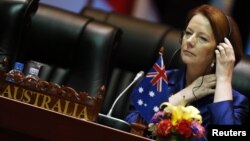SYDNEY, AUSTRALIA —
Democracy campaigners are criticizing talks that have raised the prospect of a resumption of defense ties between Australia and Burma. The Australian prime minister has met with Burmese President Thein Sein at the Asia Europe Summit in Laos. Burma Campaign Australia says it was inappropriate for Gillard to discuss defense ties given the "ongoing violation of human rights" by the Burmese military.
For the first time in almost 30 years, an Australian prime minister has held talks with the president of Burma, Thein Sein. Attending the Asia Europe Summit in Laos, Julia Gillard raised Australia's concerns about the continuing human rights abuses against ethnic minorities in Burma.
She also praised the Burmese authorities for their adoption of democratic reforms. In April, 2012, Burma conducted parliament by-elections, which were endorsed by Australia.
From 1962 to 2011, the largest mainland nation in Southeast Asia was controlled by a military dictatorship, which crushed almost all dissent and faced widespread condemnation and sanctions from the international community.
Australia has promised that, as Burma continues to embrace democratic freedoms, Canberra will reduce trade barriers and continue to ease sanctions.
Burma Campaign Australia Coordinator Zetty Brake warns against moving too quickly on boosting defense ties.
“It is quite concerning that, on one hand, we had Julia Gillard making comments and raising concerns around human rights, but on the other hand talking about building ties with the entity - the Burmese army - who is committing most of these human rights abuses,” said Brake.
Activists worry that Australia’s growing warmth towards Burma may result in Canberra lifting an embargo that remains in place. Brake says, despite the country’s ongoing reforms, there are still concerns about the Burmese military’s persecution of minorities.
“Since March, 2011, the number of human rights abuses in ethnic areas have increased, not decreased. So there still is a very serious issue to do with human rights abuses,” said Brake.
Last month, the United States said it supported Burma’s participation as an observer in the largest multilateral military exercise in the Asia Pacific. Some military analysts say the move is a critical step for establishing ties with the most influential and powerful part of the Burmese state. But rights groups have raised concerns about the military’s continuing lack of accountability for its abuses.
Prime Minister Gillard has asked the Burmese president to visit Australia along with Aung San Suu Kyi, the nation’s most famous democracy campaigner.
Australia is one of the largest aid donors in Burma. Canberra’s assistance will double to $100 million by 2015.
A third of Burma’s 60 million people are estimated to be living in poverty.
The nation has eight major ethnic groups. The largest ethnic group is the Burman people. Their traditional dominance over other groups, including Muslim Rohingyas, has caused intense tension and, at times, bloodshed, as Burma makes the transition from years of military rule to democracy.
For the first time in almost 30 years, an Australian prime minister has held talks with the president of Burma, Thein Sein. Attending the Asia Europe Summit in Laos, Julia Gillard raised Australia's concerns about the continuing human rights abuses against ethnic minorities in Burma.
She also praised the Burmese authorities for their adoption of democratic reforms. In April, 2012, Burma conducted parliament by-elections, which were endorsed by Australia.
From 1962 to 2011, the largest mainland nation in Southeast Asia was controlled by a military dictatorship, which crushed almost all dissent and faced widespread condemnation and sanctions from the international community.
Australia has promised that, as Burma continues to embrace democratic freedoms, Canberra will reduce trade barriers and continue to ease sanctions.
Burma Campaign Australia Coordinator Zetty Brake warns against moving too quickly on boosting defense ties.
“It is quite concerning that, on one hand, we had Julia Gillard making comments and raising concerns around human rights, but on the other hand talking about building ties with the entity - the Burmese army - who is committing most of these human rights abuses,” said Brake.
Activists worry that Australia’s growing warmth towards Burma may result in Canberra lifting an embargo that remains in place. Brake says, despite the country’s ongoing reforms, there are still concerns about the Burmese military’s persecution of minorities.
“Since March, 2011, the number of human rights abuses in ethnic areas have increased, not decreased. So there still is a very serious issue to do with human rights abuses,” said Brake.
Last month, the United States said it supported Burma’s participation as an observer in the largest multilateral military exercise in the Asia Pacific. Some military analysts say the move is a critical step for establishing ties with the most influential and powerful part of the Burmese state. But rights groups have raised concerns about the military’s continuing lack of accountability for its abuses.
Prime Minister Gillard has asked the Burmese president to visit Australia along with Aung San Suu Kyi, the nation’s most famous democracy campaigner.
Australia is one of the largest aid donors in Burma. Canberra’s assistance will double to $100 million by 2015.
A third of Burma’s 60 million people are estimated to be living in poverty.
The nation has eight major ethnic groups. The largest ethnic group is the Burman people. Their traditional dominance over other groups, including Muslim Rohingyas, has caused intense tension and, at times, bloodshed, as Burma makes the transition from years of military rule to democracy.




